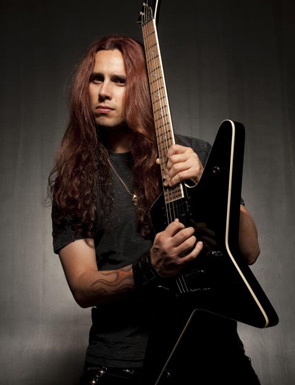Gus G. Discusses His Role as Ozzy's New Axslinger
All the latest guitar news, interviews, lessons, reviews, deals and more, direct to your inbox!
You are now subscribed
Your newsletter sign-up was successful

Originally published in Guitar World, August 2010
Ozzy Osbourne's new guitarist has the requisite heavy metal muscles, mane and moniker. But Gus G. isn't just a Zakk Wylde clone.
Gus G. recalls the moment he knew he wanted to become a guitarist. “My father was playing ‘Do You Feel Like We Do’ on the stereo,” he says. “I heard all this talk-box guitar, and I was transfixed. I thought, I want a guitar. I want to play like that. So it was Peter Frampton that turned me on to becoming a guitarist.”
Gus G. laughs. The irony of the Seventies soft-rock paragon inspiring his career is not lost on him. Since being weaned on his father’s AOR vinyl collection, Gus has evolved into a dynamic hard rock guitarist with a powerhouse shredding technique, one that landed him his current job as Ozzy Osbourne’s new guitarist after the singer parted ways with Zakk Wylde last year. Gus can be heard playing ripping, visceral licks all over Ozzy’s new album, Scream.
With his distinctive dyed red mane and muscular physique, Gus looks the part of a heavy metal guitarist. But he has the chops as well, not to mention the cred, having established himself with Dream Evil, Nightrage, Arch Enemy and his own band, Firewind, before joining Ozzy. Even Wylde is convinced his replacement can deliver what’s required. “Gus G. is a fucking awesome guitarist,” Zakk told Metal Hammer magazine last month. “I’m sure he’s going to write some slammin’ shit.”
Born Kostas Karamitroudis in Thessaloniki, Greece, Gus G. started playing at age 10 when his father, a schoolteacher and part-time musician, bought him a cheap, classical guitar and sent him to a small, local music school. Initially, his influences came through school friends swapping cassettes featuring Iron Maiden, Deep Purple, Led Zeppelin and Black Sabbath. The first solo he learned was Metallica’s “Nothing Else Matters” (because “it was the easiest,” he says). But gradually Gus’ palette expanded to include a variety of styles that inform his playing today.
“I got into the whole shred thing and found out about Vinnie Moore, Paul Gilbert and Steve Vai,” he says. “At the same time, I had a love of classic rock, like early Scorpions.”
All the latest guitar news, interviews, lessons, reviews, deals and more, direct to your inbox!
And then there’s Yngwie Malmsteen. Gus became a devotee after hearing the neoclassical virtuoso’s 1986 album, Trilogy, although he never wanted to become a clone. “Through listening to Yngwie, I found out about Paganini,” he says. “But I didn’t want to become a neoclassical rock guitarist. Yngwie was more of an influence from a sound and technical perspective.”
At 18, having been awarded a scholarship to the Berklee College of Music in Boston, he headed off to the United States with the intention of studying music, but after just two weeks, he decided he’d had enough of the academic world. “Playing in rock bands, I’ve never been required to read charts,” he says.
With the help of college friends, Gus recorded some demos under the banner of Firewind (a name he took from an Uli Roth album), and although he declares the tracks “weren’t that special,” he sent them around to record companies. Eventually, he got a letter from Eighties shred maestro David T. Chastain, who encouraged Gus to keep sending in demos and work on his style. Chastain eventually helped him to put together Firewind and produced their 2002 debut, Between Heaven and Hell.
In between albums, Gus played with various other bands, including Arch Enemy. When the group played the 2005 Ozzfest, he ran into his future employer. “That summer [metal news web site] Blabbermouth had announced that Ozzy was looking for a new guitarist,” he says. “So I went and knocked on the dressing room door and gave his people my Firewind CD.” Zakk was back in the band a couple of days later, but when Wylde and Osbourne parted ways last summer, Gus received an email from Ozzy’s office inviting him to audition.
“Initially, I was a bit stressed,” he admits. “But we jammed for a couple of hours, and then Ozzy came in and we did ‘I Don’t Know,’ ‘Bark at the Moon,’ ‘Crazy Train’ and ‘Suicide Solution.’” Gus got the gig and almost immediately went into rehearsals for a show in August at the closing ceremonies of the BlizzCon gaming convention in Anaheim, California. “I didn’t have any problems learning the songs, technically speaking,” he says. “But all of Ozzy’s guitarists have their own unique styles, and you have to pay attention to that when playing songs from each guy’s era. For example, Randy Rhoads would do all these weird little fills here and there. The first two albums he plays on are just pure genius; he was very ahead of his time. Jake E. Lee is underrated, maybe because he was in the band during Ozzy’s big-hair era. I think he’s phenomenal—a very unorthodox player. And Zakk is a really tough player—in order to live up to that you have to have a really big sound. He’s the bluesiest player of them all.”
Asked to name his favorite, Gus admits that, to him, one player stands out from the rest: “Tony Iommi. I grew up listening to him. When you first listen to it, his stuff doesn’t sound that hard, but later on I found out there are lots of small, hidden details.”
Co-producer Kevin Churko had completed most of the groundwork on Scream, including the basic guitar parts, by the time Gus arrived on the scene. Taking a backseat was a challenge for the guitarist, who is accustomed to writing and producing his own albums. But after recording the solos for Scream, Gus was pleasantly surprised when Churko and Ozzy asked him to come back and retrack all of Churko’s guitar parts. “Kevin’s not a guitar player, so he doesn’t think like one,” Gus explains. “What they needed was a real guitar player to lay down all the riffs and solos.”
Gus’ studio setup consisted of just his ESP signature series guitar through a couple of Blackstar heads. He got turned on to Blackstar amps during the sessions, when someone brought a 200-watt Series One 200 four-channel head to the studio. “Blackstars are made by a bunch of ex-Marshall amp builders, so there’s a connection there and a similarity in the tones,” Gus explains. “It has these big-ass KT88 tubes that sound really great. The EQ is exceptionally well balanced and the distortion has great crunch. The amp fits my style and sound perfectly.”
His basic approach for Scream was to record two rhythm guitar tracks through a Blackstar Series One 100 head and another two rhythm tracks with a Marshall JCM800. “We used a 4x12 cabinet with Electro-Voice speakers for the Marshall and Celestions for the Blackstar,” Gus says. “They created two different sounds that complemented each other very nicely.” The Blackstar 200 was his main amp for the solos. Onstage he uses six Blackstar 200 heads and 12 matching Series One 4x12 cabinets. “It’s very loud,” he says, laughing.
Having committed to touring and promoting Scream in 2010, Gus has had to put Firewind on hold and is now preparing to face an audience who will be comparing him to Ozzy’s longest-serving and, in many quarters, most popular guitarist. It’s a daunting task, but he’s pragmatic about it.
“My attitude is that I’m going to play the best I can,” Gus says. “There’s already been a lot of negative reaction on the internet, and initially it bothered me. But then I figured I could either walk away or just do what I have to do. If people want to throw shit at me for that…whatever.”
